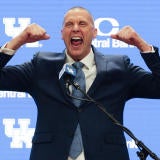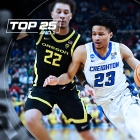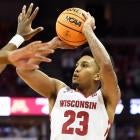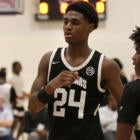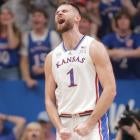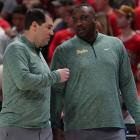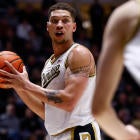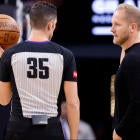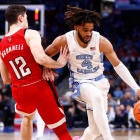| 1939 |
Oregon wins first NCAA tournament |
Ducks defeat Ohio State at Patten Gymnasium on the campus of Northwestern University to claim the NCAA’s first national championship. |
| 1963 |
Loyola (Ill.) vs. Mississippi State |
The “Game of Change” only occurred because Mississippi State defied a governor that did not want the team playing against a Loyola team that included four African-American starters. |
| 1966 |
A win for Civil Rights |
Texas Western’s 72-65 victory against Kentucky was a win for the school and the Civil Rights Movement. |
| 1973 |
Walton leads Bruins to title |
Bill Walton’s line in the 1973 title game is truly unbelievable. He was 21 of 22 from the field with 44 points and 13 rebounds. |
| 1974 |
N.C. State ends UCLA’s run |
The Bruins had won seven titles in a row and was looking for No. 8. However, NC State, behind AP Player of the Year David Thompson, ended the Bruins’ reign with an 80-77 overtime win in the national semifinal. The Wolfpack went on to win the title. |
| 1975 |
Wooden goes out with 10th title |
After a Final Four win against Louisville, and at age 65, John Wooden announced his retirement during the postgame press conference. Two days later, the Bruins outran Kentucky 92-85 for his 10th crown. |
| 1976 |
Indiana wins the title — perfectly |
Since Bob Knight’s Hoosiers won the title 36 years ago, only two teams have even entered the NCAA tournament unbeaten, let alone won the whole thing. |
| 1977 |
Marquette’s McGuire goes out on top |
McGuire’s Warriors needed a last-second shot off a full-court pass to get by UNC-Charlotte in the Final Four before upending Dean Smith’s Tar Heels in the final. |
| 1979 |
Magic vs. Bird |
Michigan State’s win against unbeaten Indiana State remains the highest-rated game in college basketball history — and it ushered in a new era in basketball. |
| 1981 |
Ainge’s full-court drive leads BYU last-second win |
BYU was down a point with eight seconds left in the East semifinals. Ainge took the inbound, dribbled behind his back between two defenders and hit a layup with two seconds left. |
| 1981 |
U.S. Reed, Rolando Blackman and John Smith |
First, Reed hits a halfcourt shot to lift Arkansas past defending champion Louisville. Moments later, Blackman drains a jumper at the buzzer to give Kansas State a victory against top-seeded Oregon State. And right after that, Smith converts a layup as St. Joseph’s stuns No. 1 DePaul. NBC’s cut-around coverage allowed viewers to see all three finishes and people recognize that day as the birth of March Madness. |
| 1982 |
Jordan hits game-winner to lead North Carolina |
Freshman Michael Jordan swished a 16-foot jumper from the left wing for a late lead in the title game, but Georgetown had enough time to set up a game-winner of its own. Yet Fred Brown mistook teammate Eric Floyd for UNC’s James Worthy, who dribbled out the clock on an improbable finish. |
| 1983 |
NC State’s last second win against Houston |
Lorenzo Charles dunked NC State into the record books — and Jim Valvano into coaching royalty — after Dereck Whittenburg launched a shot that fell about a foot short. |
| 1985 |
Andre Turner: Twice a hero |
Memphis’ Andre Turner willed the Tigers into the 1985 Final Four with game-winning shots in the second round (against UAB 67-66 in overtime), and again in the regional semifinals (59-57 against Boston College). |
| 1985 |
Villanova upsets Georgetown |
Villanova, an eight seed, shoots 22 of 28, 78 percent from the field — still a championship game record — and beats heavily favored Georgetown in the title game. |
| 1987 |
Indiana’s Smart shocks Syracuse |
In the same year the movie Hoosiers came out, Indiana Hoosier Keith Smart scored 12 of his team’s final 15 points, including a 16-footer in the final seconds, as Indiana shocked Syracuse in the national final. |
| 1989 |
Rumeal Robinson seals Michigan victory |
Robinson sure wasn’t automatic from the foul line during the regular season, but he hit a pair of free throws with no time left on the clock to give Michigan the national title. |
| 1990 |
Loyola Marymount’s Bo Kimble shoots lefty |
Bo Kimble shot his first free throw during each of the Lions’ three NCAA tourney games left-handed in honor of Hank Gathers. |
| 1990 |
UConn’s Tate George beats Clemson in final seconds |
No. 1 seed Connecticut trailed 70-69 in the East Region semifinals — blowing a 19-point second-half lead — when Scott Burrell launched a 94-foot pass to Tate George. George sunk a 16-foot jumper to give UConn an improbable victory. |
| 1990 |
Laettner…before the Kentucky game |
Two days after Connecticut eliminated Clemson with a jumper at the buzzer, the Huskies got a taste of their own medicine when Laettner hit a shot as the horn sounded, putting Duke into the Final Four. |
| 1991 |
Duke upsets UNLV |
UNLV entered the Final Four 34-0 and faced Duke, a team the Runnin’ Rebels beat by 30 in the 1990 final. Duke pulled off the upset 79-77 and went on to win its first national title. |
| 1991 |
Richmond makes history |
Six No. 15 seeds have won NCAA tournament games, but the Spiders were the first, pulling an improbable 73-69 win against second-seeded Syracuse. |
| 1992 |
Laettner hits last-second shot against Kentucky |
In the East Regional final, Duke’s Grant Hill hurls a three-quarters court pass to Christian Laettner, who catches it at the free-throw line. He takes one dribble to his right, spins left and shoots just before time expires. |
| 1995 |
Tyus Edney saves UCLA |
Since Missouri didn’t double-team Edney, he was able to take the inbounds pass at full speed with his team down one with just under five ticks left in the second-round. Edney’s speed saved UCLA’s run to its 11th national title. |
| 1996 |
Mile High Madness: Syracuse beats Georgia in OT |
In a Sweet 16 game in Denver that featured both teams blowing double-digit leads and a buzzer-beating jumper by Syracuse’s Jason Cipolla that forced overtime, the true Madness came with three lead changes in the final 15 seconds of overtime. John Wallace’s layup gave the Orangemen an 80-78 lead, but Pertha Robinson answered with a three-pointer to put the Bulldogs back in front 81-80. But Wallace had the last say, drilling a 3-pointer from the top of the key with three seconds left to continue Syracuse’s road that eventually ended in the national championship game loss to Kentucky. |
| 1998 |
The Bryce Drew shot — Valpo upsets Ole Miss |
Jamie Sykes floated a pass to Bill Jenkins, who caught it and passed to Bryce Drew in one motion. Drew, then hit the game-winning 3. |
| 1998 |
Rip rips the hearts out of the Washington Huskies |
The third time was a charm as Connecticut got three shots off in the final eight seconds of a regional semifinal, with the final one from Richard Hamilton being true, lifting the Huskies against Washington 75-74. |
| 1999 |
The nation meets Gonzaga |
The country learns that there’s more to Gonzaga basketball than John Stockton. The 10th seeded Bulldogs knocked off Minnesota, Stanford and Florida before falling to eventual national champion Connecticut in the regional final. Thirteen years later, the Zags remain a national force on the college basketball scene. |
| 2001 |
Hampton coach Steve Merfeld gets a lift |
Tarvis Williams’ jumper in the final seconds gave Hampton a 58-57 win against Iowa State, making the Pirates only the fourth No. 15 seed to defeat the No. 2 seed. The picture of Merfeld being lifted up from behind by Hampton’s David Johnson as the coach pumped his fists and kicked his legs in the air is one of the great images in tournament history. |
| 2005 |
Regional Finals for the ages |
March 26-27: Louisville earned a trip to the Final Four by rallying from a 19-point deficit to beat West Virginia in overtime 93-85. But that comeback paled in comparison to what Illinois had in store later in the day. Arizona led the Illini by 15 points with four minutes left but remarkably Illinois rallied to force overtime, eventually winning 90-89 in one of the greatest games in tournament history. A day later, Michigan State and Kentucky played a classic of their own, with the Spartans prevailing 94-88 in double overtime. |
| 2006 |
George Mason reaches Final Four |
Talk about the little team that could. Tiny George Mason beat Michigan State and North Carolina, outran Wichita State in the Sweet 16 then shocked top-ranked Connecticut to reach the Final Four. |
| 2008 |
Kansas comes back in closing minutes to win title |
Down nine with 2:12 left, Kansas cut into Memphis’ lead and had a chance to tie the national title game. Kansas junior, Mario Chalmers, with two seconds remaining, shot over two Memphis defenders to tie the contest and set the stage for a Kansas win in OT. |
| 2010 |
Butler comes oh so close |
Butler’s Gordon Hayward grabbed the rebound off a missed free throw, dribbled to halfcourt and let a shot fly — that missed by less than an inch. Duke won its fourth title, but Butler won America’s heart. |
| 2011 |
VCU goes from First Four to the Final Four |
The bracket expanded to 68 teams for the 2011 tournament, and the new format resulted in four first-round games to get the tournament under way. Any thought that these games weren’t really part of the tournament quickly lost credibility when Virginia Commonwealth downed USC, Purdue, Georgetown, Florida State and top-seeded Kansas to make it to the Final Four in Houston. |
| 2012 |
Twice in one day? Afraid so, Missouri and Duke |
A No. 15 seed beating a No. 2 seed had only happened four times in tournament history. So what were the odds of it happening twice within hours of each other? That’s what happened when Norfolk State shocked Missouri late in the afternoon of March 16. Early that evening, Lehigh did the same to Duke. |








